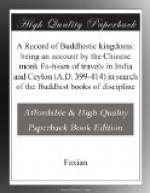After proceeding in this way for rather more than ninety days, they arrived at a country called Java-dvipa, where various forms of error and Brahmanism are flourishing, while Buddhism in it is not worth speaking of. After staying there for five months, (Fa-hien) again embarked in another large merchantman, which also had on board more than 200 men. They carried provisions for fifty days, and commenced the voyage on the sixteenth day of the fourth month.
Fa-hien kept his retreat on board the ship. They took a course to the north-east, intending to fetch Kwang-chow. After more than a month, when the night-drum had sounded the second watch, they encountered a black wind and tempestuous rain, which threw the merchants and passengers into consternation. Fa-hien again with all his heart directed his thoughts to Kwan-she-yin and the monkish communities of the land of Han; and, through their dread and mysterious protection, was preserved to day-break. After day-break, the Brahmans deliberated together and said, “It is having this Sramana on board which has occasioned our misfortune and brought us this great and bitter suffering. Let us land the bhikshu and place him on some island-shore. We must not for the sake of one man allow ourselves to be exposed to such imminent peril.” A patron of Fa-hien, however, said to them, “If you land the bhikshu, you must at the same time land me; and if you do not, then you must kill me. If you land this Sramana, when I get to the land of Han, I will go to the king, and inform against you. The king also reveres and believes the Law of Buddha, and honours the bhikshus.” The merchants hereupon were perplexed, and did not dare immediately to land (Fa-hien).
At this time the sky continued very dark and gloomy, and the sailing-masters looked at one another and made mistakes. More than seventy days passed (from their leaving Java), and the provisions and water were nearly exhausted. They used the salt-water of the sea for cooking, and carefully divided the (fresh) water, each man getting two pints. Soon the whole was nearly gone, and the merchants took counsel and said, “At the ordinary rate of sailing we ought to have reached Kwang-chow, and now the time is passed by many days;—must we not have held a wrong course?” Immediately they directed




